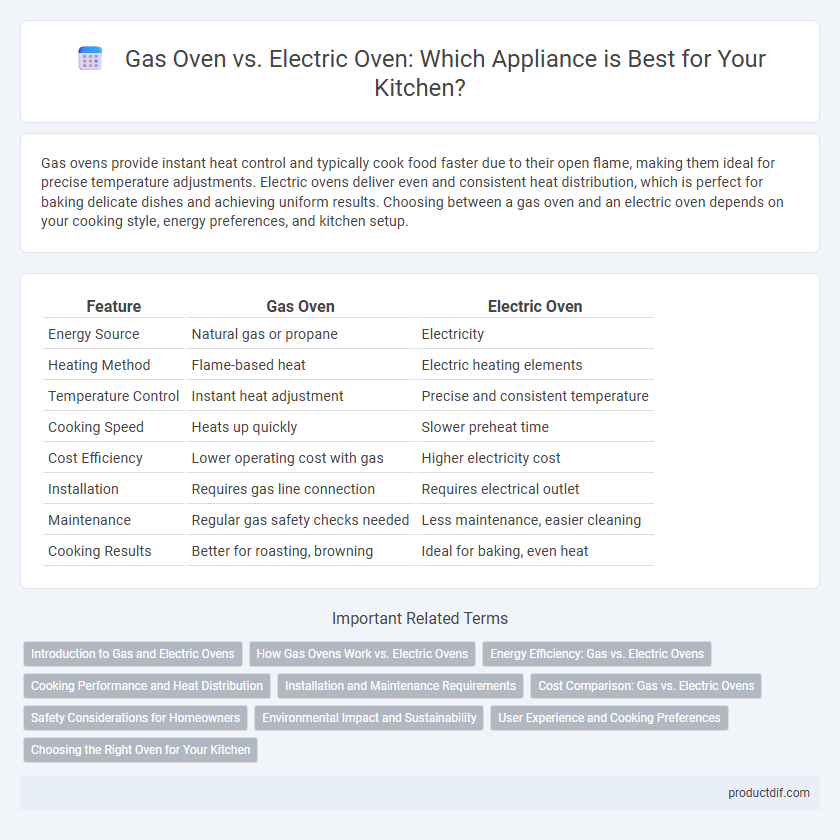Gas ovens provide instant heat control and typically cook food faster due to their open flame, making them ideal for precise temperature adjustments. Electric ovens deliver even and consistent heat distribution, which is perfect for baking delicate dishes and achieving uniform results. Choosing between a gas oven and an electric oven depends on your cooking style, energy preferences, and kitchen setup.
Table of Comparison
| Feature | Gas Oven | Electric Oven |
|---|---|---|
| Energy Source | Natural gas or propane | Electricity |
| Heating Method | Flame-based heat | Electric heating elements |
| Temperature Control | Instant heat adjustment | Precise and consistent temperature |
| Cooking Speed | Heats up quickly | Slower preheat time |
| Cost Efficiency | Lower operating cost with gas | Higher electricity cost |
| Installation | Requires gas line connection | Requires electrical outlet |
| Maintenance | Regular gas safety checks needed | Less maintenance, easier cleaning |
| Cooking Results | Better for roasting, browning | Ideal for baking, even heat |
Introduction to Gas and Electric Ovens
Gas ovens use natural gas or propane to generate heat, offering rapid temperature adjustments and often lower operating costs. Electric ovens rely on electrical resistance heating elements to provide consistent and even cooking temperatures, with advanced models featuring convection fans for improved heat distribution. Choosing between gas and electric ovens depends on factors such as fuel availability, cooking preferences, and kitchen infrastructure.
How Gas Ovens Work vs. Electric Ovens
Gas ovens operate by igniting natural gas or propane through a burner located at the bottom, producing an open flame that heats the oven cavity directly for rapid temperature changes and moist cooking environments. Electric ovens use heating elements, typically located at the bottom and top of the oven, which convert electrical energy into heat, allowing for more precise temperature control and even heat distribution. The difference in heating methods affects cooking performance, energy consumption, and maintenance requirements between gas and electric ovens.
Energy Efficiency: Gas vs. Electric Ovens
Gas ovens typically offer faster preheating times and more precise temperature control, making them energy-efficient for quick cooking tasks. Electric ovens, however, provide consistent heat distribution and better insulation, which reduces energy loss during longer cooking periods. When evaluating energy efficiency, gas ovens consume natural gas, often cheaper per unit of energy, while electric ovens rely on electricity that may come from renewable sources, impacting overall energy sustainability.
Cooking Performance and Heat Distribution
Gas ovens offer superior heat control with instant temperature adjustments, allowing precise cooking conditions ideal for recipes requiring quick temperature changes. Electric ovens provide more consistent heat distribution due to even heating elements, resulting in uniform baking and roasting without hot spots. The choice depends on whether immediate temperature responsiveness or steady, even heat is prioritized for optimal cooking performance.
Installation and Maintenance Requirements
Gas ovens require a professional installation connecting to a natural gas line, ensuring proper ventilation to avoid gas leaks and carbon monoxide buildup. Electric ovens typically need a dedicated high-voltage electrical outlet, which may require upgrading the home's wiring system. Maintenance for gas ovens involves regular inspection of burners and gas lines, while electric ovens mainly require cleaning of heating elements and checks on electrical components.
Cost Comparison: Gas vs. Electric Ovens
Gas ovens typically have lower upfront costs and reduced monthly utility bills due to the lower price of natural gas compared to electricity. Electric ovens often entail higher installation expenses, especially if electrical upgrades are required, but they benefit from more consistent cooking temperatures and easier maintenance. Over time, gas ovens generally provide better cost efficiency for users with access to affordable natural gas, while electric ovens may lead to higher operational costs depending on local electricity rates.
Safety Considerations for Homeowners
Gas ovens pose risks of carbon monoxide leaks and gas explosions, requiring proper ventilation and regular maintenance to ensure homeowner safety. Electric ovens eliminate these hazards but demand caution to prevent electrical shocks and fire risks from faulty wiring or damaged heating elements. Installing safety detectors, such as carbon monoxide alarms for gas ovens and smoke alarms near all ovens, enhances overall home safety.
Environmental Impact and Sustainability
Gas ovens emit higher levels of carbon dioxide and methane, contributing to greater greenhouse gas emissions compared to electric ovens. Electric ovens powered by renewable energy sources offer a more sustainable cooking option with lower environmental impact. Lifecycle assessments also show that electric ovens generally have a smaller carbon footprint due to cleaner energy generation and increased energy efficiency.
User Experience and Cooking Preferences
Gas ovens provide precise temperature control and instant heat adjustments, appealing to users who prioritize traditional cooking techniques and faster preheating. Electric ovens offer even heat distribution and consistent temperatures, making them ideal for baking and roasting with less temperature fluctuation. User preferences often depend on cooking style, with gas favored for high-heat cooking and electric preferred for delicate or slow-cooked dishes.
Choosing the Right Oven for Your Kitchen
Gas ovens offer precise temperature control and quicker heat changes, making them ideal for chefs who value responsiveness and energy efficiency. Electric ovens provide even heating and consistent baking results, perfect for delicate recipes requiring steady temperatures. Consider kitchen infrastructure, cooking preferences, and energy costs when choosing between gas and electric ovens to optimize performance and utility.
Gas oven vs electric oven Infographic

 productdif.com
productdif.com